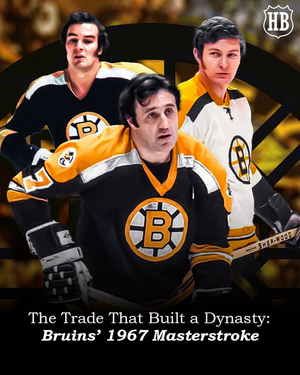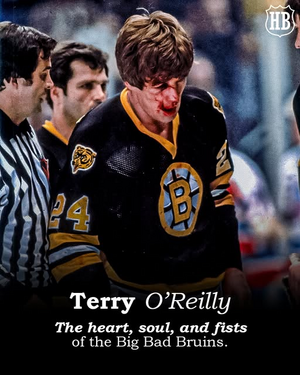captain stone
Well-known member
Then expect no changes on the ice either.















Stan Jonathan wasn’t just tough—he was a wrecking ball in skates. At just 5'8", he didn’t tower over anyone, but it didn’t matter. What made him legendary was the way he used every inch of his frame to bulldoze opponents, deliver bone-rattling hits, and scrap with guys twice his size. Fans in Boston fell in love with him because he played with the kind of fire that made the old Boston Garden shake. He wasn’t just throwing fists—he was defending the crest on his chest like it was life or death. You never had to guess if Stan Jonathan was going to show up on a given night. He was always dialed in, always dangerous, and always fearless.
One of the most iconic moments that solidified his reputation came during the 1978 Stanley Cup Final against the Canadiens. Jonathan squared off with Pierre Bouchard, a guy who had six inches and fifty pounds on him. It should’ve been a mismatch—but it wasn’t. Jonathan absolutely destroyed Bouchard in what remains one of the most brutal and lopsided fights in NHL history. He hammered him with short, piston-like punches that left Bouchard bloodied and stunned. The fight was so ferocious that even non-Bruins fans stood up and took notice. It was a message to the league: don’t let the size fool you—Jonathan was one of the baddest men on the ice.
But it wasn’t just his fists. Jonathan could actually play. He had soft hands around the net and the hockey IQ to make smart plays, which made him even more dangerous. He wasn’t some one-dimensional enforcer. He could contribute offensively and then drop the gloves to protect a teammate the next shift. That blend of skill, grit, and relentless tenacity is what made him a fan favorite. To this day, old-school Bruins fans still talk about him with a gleam in their eye, because Stan Jonathan embodied everything the “Big Bad Bruins” were all about—heart, toughness, and a refusal to back down from anyone.
2K
Terry O’Reilly wasn’t the most skilled player on the ice, but he was the heartbeat of the Bruins during the 1970s and early ‘80s. Fans loved him because he brought grit, toughness, and an unrelenting work ethic to every shift. He was the kind of player who’d throw a hit, drop the gloves, and still find a way to chip in offensively. O’Reilly wasn’t just an enforcer—he could play. He scored over 600 points in his career, including a 90-point season in 1977-78, proving he was more than just muscle. But it was his willingness to stand up for teammates, battle in the corners, and take on anyone that truly endeared him to Boston. He played the game with fire in his belly, and that fire matched the spirit of the city.
What made O’Reilly so iconic wasn’t just his toughness—it was his loyalty and leadership. He spent his entire NHL career in black and gold, later becoming the team’s head coach. His legendary moment climbing into the stands at Madison Square Garden to defend a teammate cemented his place in Bruins lore—not just as a player, but as a symbol of brotherhood and fight. Bruins fans didn’t just respect him—they felt like he represented them on the ice. No one bled for the B like O’Reilly did, and that’s why he remains one of the most cherished figures in franchise history
.View attachment 18476














Gerry Cheevers was the backbone of the Boston Bruins’ Stanley Cup-winning teams in 1970 and 1972, providing clutch goaltending when it mattered most. Known for his fearless and aggressive style in net, he thrived in high-pressure situations and was a key piece of the Bruins' dominance in the early 1970s.
One of the most iconic aspects of Cheevers' career was his legendary mask, adorned with hand-drawn stitch marks for every puck that hit him in the face—a symbol of his toughness and resilience. His impact extended beyond his playing days, as he remained involved with the Bruins as a coach and ambassador for the team.
With his combination of skill, confidence, and personality, Cheevers remains one of the most beloved goaltenders in Bruins history, forever remembered as a key figure in Boston’s golden era of hockey.
1.5K












